Muslim MP opposing calls to scrap Christian prayers at the start of Commons sittings_Nhy
Calls to scrap Christian prayers at the start of every House of Commons sitting are being opposed – by a new Muslim MP.
Independent MP Shockat Adam sprang to the defence of the daily worship after nine MPs – including three new Labour members said ‘religious worship should not play any part in the formal business of the Commons’.
In a tradition dating back to 1558, each daily session at the Commons begins with a few minutes of private Christian prayer and contemplation.
Last month, the Mail on Sunday revealed how some of the new generation of Labour MPs had told the Commons’ modernisation committee that the practice was out of date.
And last week, nine MPs – led by newly-elected Labour politician Neil Duncan-Jordan – publicly called for the prayers to cease.
In a Commons early day motion, they say that ‘Parliamentary meetings should be conducted in a manner that is equally welcoming to all attendees, irrespective of their personal beliefs’.
The MPs – including three Labour and three Liberal Democrats – say Parliamentary prayers ‘are not compatible with a society that respects the principles of freedom of and from religion’.
And they are asking the modernisation committee to consider ‘alternative arrangements’.

Independent MP Shockat Adam (pictured standing) has defended customary daily prayers at the start of Commons sittings

Starting the day with private prayers in the Commons is a tradition dating back to 1558, but nine MPs have called for the practice to cease
But last night, Leicester South MP Mr Adam – who was himself only elected last July – disagreed.
He told the Mail on Sunday: ‘Prayers in the House of Commons are part of our Christian heritage and Parliament’s traditions.
‘They’re not compulsory, so MPs have a choice whether to attend or not.
‘So I see no reason for them not to continue.’
He added: ‘MPs of other faiths don’t need collective prayers in the Chamber but should remain free to pray in their own private way on the Parliamentary estate.’
Last month, veteran Conservative MP Sir John Hayes hit out at the ‘arrogance’ of ‘new kids in town’ who wanted prayers scrapped, accusing them of a ‘lack of respect’ for Parliament’s Christian traditions.
Sir John, first elected in 1997, said: ‘Whether you believe in the divine or not, it’s important to recognise our country is rooted in the Christian traditions.
‘Prayers are a reminder of that.’
READ MORE:
Foreign Office spends £3.75million of taxpayers’ money on advertising anti-immigration campaign which claims Britain is ‘bigoted’ and ‘run down’
Millions of pounds of taxpayers’ money have been spent on a campaign in Albania which describes Britain as a ‘bigoted’ and ‘run-down’ country, it emerged last night.
The Foreign Office ran the social media campaign with the aim of preventing Albanians coming to the UK illegally.
Videos were posted on Instagram, Facebook and TikTok, featuring Albanian refugees in Britain who complained about how expensive living was and how much discrimination they have faced.
They also featured images of closed shops covered in graffiti, run-down flats and piles of furniture lying next to a housing estate.
The campaign, which cost £3.75million a year, was overseen by the Foreign Office, and was begun under the last Tory government and continued by Labour.
It was started amid an unprecedented rise in Albanian migrants crossing the English Channel on small boats in 2022.
Home Office data showed 12,000 Albanians arrived that year, despite the country not being in a state of war, nor being as poor as Sudan or Syria.
An internal Foreign Office document, seen by the i Paper, said that the entire campaign failed, as it did not reduce irregular migration from Albania.

Videos were posted on Instagram, Facebook and TikTok, featuring Albanian refugees in Britain who complained about how expensive living was and how much discrimination they have faced

The Foreign Office ran the social media campaign with the aim of preventing Albanians coming to the UK illegally

It was started amid an unprecedented rise in migrants crossing the English Channel on small boats in 2022 (Picture dated May 2024)
The document said: ‘There is limited evidence of the effectiveness of a dissuasive communications approach.’
Last night politicians and activists criticised the programme. Reform leader Nigel Farage branded the campaign ‘an absolute farce,’ even though he agrees the Government must do all it can to deter illegal migration.
He said: ‘It goes along with the whole narrative that Labour hates our country.’
In one of the videos, an Albanian graduate called Vera living in the UK says she is working in the hospitality industry, and finding it difficult to adapt.
She adds: ‘The mindset that people have about Albanians… is not a very positive mindset. To live in England is very difficult.’



